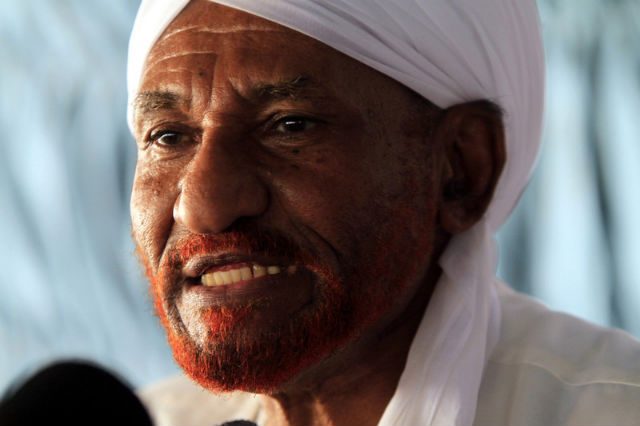SUMMARY
This is AI generated summarization, which may have errors. For context, always refer to the full article.

KHARTOUM, Sudan – Sudan’s state security arrested opposition leader and ex-premier Sadiq al-Mahdi for treason on Saturday, May 17, party officials said, placing in doubt efforts at governmental reform in the impoverished, war-torn and politically divided country.
By arresting Mahdi, a veteran of five decades on Sudan’s political scene, the regime of President Omar al-Bashir “retreats from all promises about dialogue and goes back to square one”, Sara Najdallah, secretary general of Mahdi’s Umma Party, told reporters at a press conference late Saturday.
“The Umma Party announces that it has stopped the dialogue with NCP,” she said, referring to Bashir’s ruling National Congress Party.
The regime seized power 25 years ago in an Islamist-backed coup.
Najdallah called for Mahdi’s immediate release and announced an “alert” for Umma’s supporters to peacefully show opposition to his arrest.
He is being investigated for alleged treason, said his daughter Mariam al-Mahdi, a senior Umma member.
The arrest came after Mahdi reportedly accused a counter-insurgency unit of rape and other abuses of civilians in Darfur.
It also coincided with the “national dialogue” in which Umma and some other opposition parties were engaged with Bashir.
A senior opposition politician earlier told Agence France-Presse that Umma was a main focus of the dialogue process that might lead to a new, coalition government.
The politician said Bashir was pushing for “a real change” because he realises the country is “collapsing”, but the security service is resisting any dialogue.
An Umma official said agents arrived in two pickup trucks and several cars to arrest Mahdi, one of the highest-profile figures to be detained in Sudan in recent years.
“At 8:45 pm (1745 GMT) a number of state security officers came to the home of imam Sadiq Al-Mahdi with a warrant, and they arrested him,” his secretary, Mohammed Zaki, told Agence France-Presse.
Challenges mounting
The National Intelligence and Security Service (NISS) has the right to detain people for more than four months without judicial review.
Earlier Saturday Mahdi had addressed thousands of people in Gezira state, south of Khartoum.
He told them it was time to end the country’s silence over activities of the security service, witnesses said.
A government source told Agence France-Presse that Mahdi is being held under an order from prosecutors because he has continued to repeat his allegations against the Rapid Support Forces (RSF) counter-insurgency unit.
On Thursday the Umma leader appeared before prosecutors for questioning over the claims he first made about the RSF at a press conference earlier this month.
Newspapers reported on Tuesday that NISS, which has authority over the RSF, filed a criminal complaint against Mahdi.
At a later news conference in Khartoum, commanders of the RSF denied their force had looted, raped or committed arson.
“All the allegations against us are lies,” an angry Mohammed Hamdan Dalgo, the unit’s field commander, shouted.
The Bashir regime has faced mounting challenges since the separation of South Sudan three years ago.
Inflation has soared and the Sudanese currency has sunk. Wars and unrest spread to about half of the country’s 18 states, and internal divisions surfaced in Bashir’s NCP.
Repression peaked in September when thousands called for the regime’s ouster. Security forces are believed to have killed more than 200 protesters, many with gunshots to the head and chest, Amnesty International said.
Those demonstrations made clear the urgent need for reform, which Bashir addressed in January when he appealed for a broad national political dialogue and “renaissance” focused on peace.
While Umma joined the dialogue, 16 opposition parties refused to participate unless certain conditions were met — including the abolition of laws restricting freedom.
Mahdi’s government was overthrown in the 1989 coup which brought Bashir to power.
More recently the aged Umma leader has been widely regarded with suspicion by the Sudanese, partly because one of his sons is a Bashir adviser. — Rappler.com
Add a comment
How does this make you feel?
There are no comments yet. Add your comment to start the conversation.